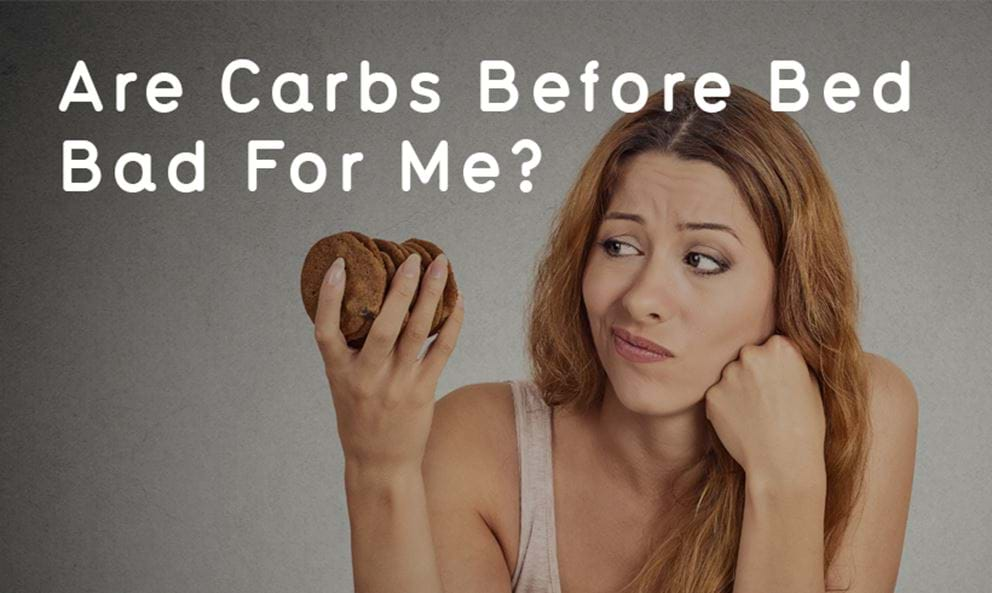Are carbs before bed bad for me?

Carbs tend to get a bad rap in today’s fitness culture. If they’re not being accused of spiking your blood sugar and inflicting a host of negative health conditions on you, they’re being pointed at as the culprit of the obesity epidemic, and the sole reason fitness conscious folk are unable to shift those extra pounds, and achieve their six-pack-related goals.
They’re Essential
The fact remains, though, that carbohydrates are an essential macronutrient, and contribute enormously to the healthy functioning of the body. This includes balanced hormone production and the overall feeling of wellbeing, which prevents you from wanting to scream at every other passer-by (ever notice how moody people seem to get on keto diets?).
And it barely needs mentioning that carbs remain the staple calorie source for the vast majority of health conscious individuals out there. Protein and healthy fats are great, but prepare to spend a fortune at the grocery store if you plan to meet your daily calorie goals just through sirloin steaks and whole eggs (while we’re on the subject, read our post about egg yolk nutrition).
Affecting Weight Loss
One of the most common and persistent myths surrounding carbs, is the idea that it’s lethal to your goals if you eat them just before bed. But where does this idea come from and, more importantly, is it true?
The fitness industry has always been a hotbed for myth and rumour. (You might also know this as “bro-science”, or “stuff I heard from a guy at the gym who was in better shape than me”). By now, most veteran fitness fanatics are aware that spot reduction (the idea that you can burn fat from specific body parts through specific exercises) is a myth, thoroughly debunked by actual, non-bro, science[1]. Yet how many first-time gym goers still churn out crunches by the thousands, in the mistaken belief that they’re burning fat from their midsections?
No Carbs Before Bed?
It turns out that there’s ample reason to believe that the “no carbs before bed” idea is a myth, which falls into the same category as spot reduction. The basic idea is that your metabolism slows down dramatically when you sleep, and so you’re more likely to store excess calories (those coming from carbs, specifically) as fat during the night.
Although one study [2]conducted in Japan did, in fact, find that energy expenditure decreased by 35% during the first half of sleep, the same study also found that energy expenditure dramatically increased during the second half; the period most associated with deep, REM sleep. Other studies have shown that the overall metabolic rate of individuals, while asleep, matched their day-time resting metabolic rate (RMR)[3]. It has also been scientifically demonstrated that individuals who exercise enjoy a raised metabolic rate during sleep, associated with raised leptin levels, which leads to greater overall fat loss.[4]
In fact, the only group who appear to actually have a lower metabolic rate while asleep than while awake, are the obese. Green tea, avocado and eggs make up a breakfast that can help boost metabolism in the morning. Head over here to find out how, as well as other food products that can support this goal.
Remains Constant
The upshot of this is that unless you are obese, your metabolic rate will remain constant day and night – and if you exercise regularly, your sleeping metabolic rate will actually be higher than your daily RMR. Not only does this mean that eating carbs before bed is a complete non-issue for most people, it also suggests that for fit individuals, a big meal before bed might actually be a great idea.
Not exactly what you were told by your ripped buddies down at the gym, is it?
The verdict is clear – train during the day, go to bed well fed, and take comfort in the knowledge that you’ll be burning fat while you sleep. It’s a win-win situation.
You’re welcome.


